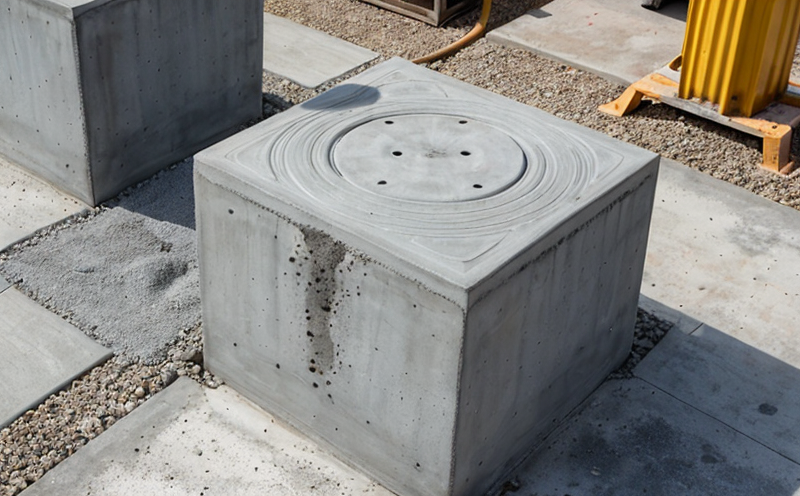EN 12390 – Concrete Early Age Strength Monitoring
The European standard EN 12390 provides a comprehensive framework for monitoring the early-age strength of concrete. This is critical in ensuring that structures are safe and comply with regulatory requirements, especially during construction phases when early strength gain can significantly impact project timelines.
Early age strength testing helps to determine if the concrete has reached sufficient strength before it undergoes stress or load. This is particularly important for pre-stressed members where early-age strength may influence the tensioning process. The standard outlines methods that allow accurate and timely measurement of compressive strength during the critical first few days post-mixing.
The testing method involves the use of small cylinders (typically 70mm or 150mm in diameter) which are cured under controlled conditions, usually at a temperature between 20°C to 25°C and relative humidity above 95%. The specimens are then tested for compressive strength using standard procedures.
EN 12390 is widely used across various sectors including infrastructure construction, building projects, and civil engineering. Its application ensures that the concrete's performance meets regulatory standards such as those set by EN 206-1:2018 for general requirements of concrete for buildings.
The standard supports quality management by providing a reliable method to monitor concrete strength during its critical early stages. This not only enhances safety but also improves project efficiency and reduces the risk of costly rework or delays due to insufficient concrete strength.
By adopting EN 12390, organizations can ensure that their concrete specimens are tested in a controlled environment that accurately reflects real-world curing conditions. This leads to more precise predictions of when structures will be safe for loading and use, thereby enhancing overall project quality control.
The methodology outlined in the standard allows for continuous monitoring of strength development over time, which is crucial for understanding how different factors such as temperature, humidity, or admixtures influence concrete performance. This information can be invaluable for R&D efforts aimed at improving concrete formulations and construction practices.
Scope and Methodology
| Aspect | Description |
|---|---|
| Test Specimens | Cylindrical specimens of 70mm or 150mm in diameter are prepared and cured under controlled conditions. These specimens represent the concrete's expected performance. |
| Curing Conditions | The specimens are kept at a temperature range between 20°C to 25°C with relative humidity above 95% for a period of time depending on the desired strength measurement. This ensures that the curing environment closely mimics real-world conditions. |
| Testing Procedure | The specimens are tested using standard compression testing machines to determine their compressive strength at various ages, typically from 1 hour post-mixing up to 7 days. This allows for early age strength monitoring and prediction. |
| Acceptance Criteria | The test results are compared against predetermined acceptance criteria set by the project specifications or regulatory standards like EN 206-1:2018 to ensure compliance. |
Eurolab Advantages
At Eurolab, we bring decades of experience in material testing and quality assurance. Our team specializes in providing accurate and reliable concrete early age strength monitoring services that meet the highest standards set by EN 12390.
We offer a turnkey solution for your concrete testing needs, from specimen preparation to result analysis. Our state-of-the-art facilities ensure that all tests are conducted under controlled conditions, providing you with consistent and reproducible results.
Our experienced technicians use the latest equipment and methods to deliver precise test results. This not only ensures compliance with EN 12390 but also helps in optimizing concrete mix designs for better performance and durability.
We pride ourselves on providing a personalized service tailored to your specific requirements. Whether you are an R&D engineer, quality manager, or procurement officer, Eurolab can offer the support needed to ensure that your projects meet all necessary standards and regulations.
Customer Impact and Satisfaction
By leveraging EN 12390 for early age strength monitoring, our customers enjoy several benefits. These include improved project timelines through more accurate predictions of when structures can safely be loaded and used. This leads to increased efficiency in construction processes while reducing the risk of delays or rework due to insufficient concrete strength.
Our services also enhance safety by ensuring that structures meet all necessary regulatory standards, thereby protecting both workers and the public. Additionally, we help our clients optimize their concrete mix designs for better performance and durability, which can lead to long-term cost savings through reduced maintenance requirements.
Customer satisfaction is paramount at Eurolab. We regularly receive positive feedback from satisfied clients who appreciate our professionalism, accuracy, and commitment to delivering high-quality services that meet their specific needs.





